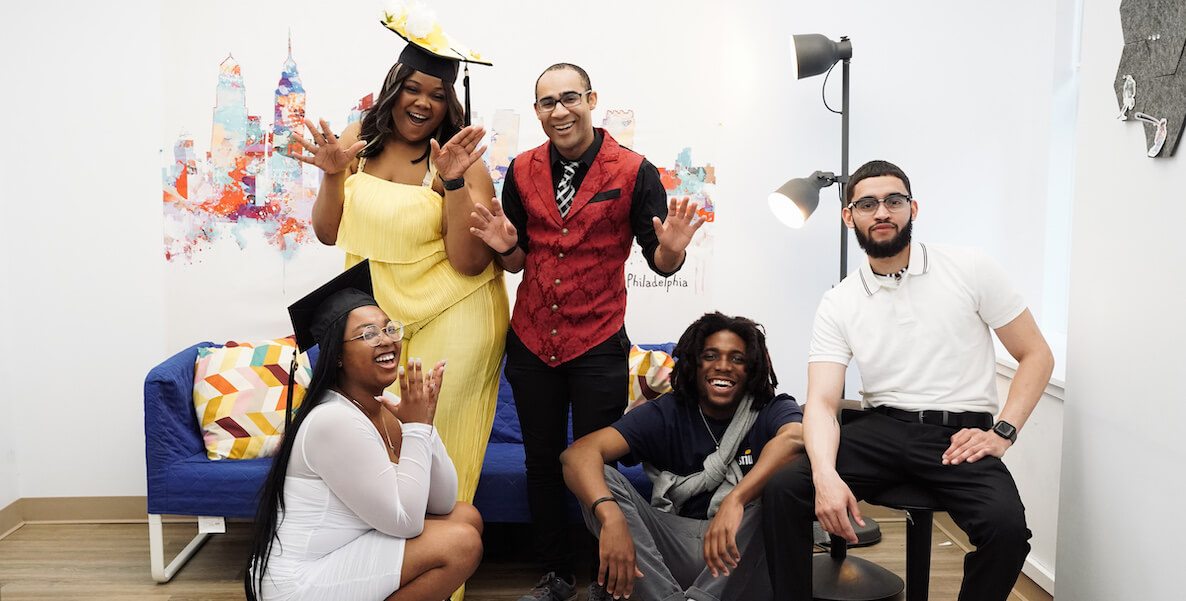It’s almost as if Southern New Hampshire University — SNHU, or “snoo,” for short — was created with Philadelphia as its muse.
As its president, Paul LeBlanc, says in Broken: How our Social Systems are Failing Us and How We Can Fix Them, “I often describe SNHU as a blue-collar institution, one that is deeply grounded in a mission of transforming the lives of students who I think of as underdogs — the nearly 40 percent of Americans who say they would struggle to come up with $400 dollars for an unexpected car repair.”
“There are so many people who are undervalued and under-appreciated based on some societal definition of what success is,” says Oscar Wang, himself a first-generation college student. “And we want to create pathways for them to be able to succeed.”
SNHU, with its in-person New England campus and its 180,000 online students around the world, was not, in fact, founded by or for Philadelphia, per se. But a new Philly-based nonprofit, College Together, has teamed up with SNHU to help often-overlooked students get to college, and through it, for just under the cost of a Pell Grant.
All of which translates to students being able to get a degree — without amassing debt.
None other than President Barack Obama, in a 2013 address about college affordability and rankings, singled out SNHU – which is accredited and nonprofit – for embracing innovative ways to “prepare students for a 21st-century economy and maintain a high level of quality without breaking the bank.”
A new model
SNHU’s mission statement says that the institution will “relentlessly challenge the status quo.” It’s that spirit that propelled Oscar Wang and Dustin Rodgers, who’d previously worked at Community College of Philadelphia, to bring SNHU to Philly in a format that they hoped would work for both adult learners who might already gravitate to alternative programs to complete degrees while working, and to recent high school graduates. It’s a model Wang refers to as “fusion” — not quite online, not quite in-person, and not quite hybrid, either.
“There are so many people who are undervalued and underappreciated based on some societal definition of what success is,” says Wang, himself a first-generation college student. “And we want to create pathways for them to be able to succeed.”
College Together’s program is part of SNHU’s community partnership model, an approach SNHU launched in 2014 (the same year LeBlanc began serving as senior policy advisor to the Under Secretary at the U.S. Department of Education); through this model, SNHU now collaborates with more than a dozen programs nationwide.
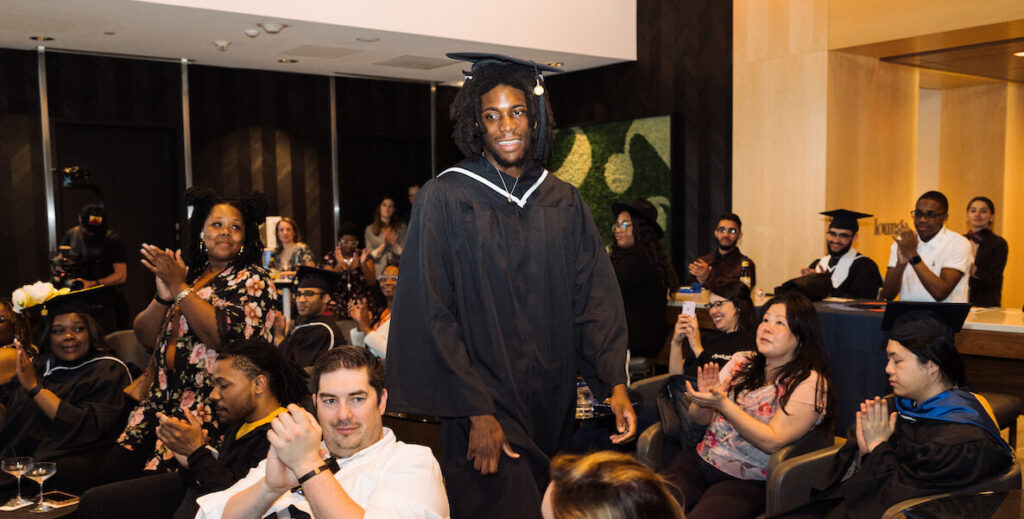
As with typical in-person higher education experiences, College Together students select majors within program areas; they can choose from business, healthcare, and communications, at either a certificate, associate’s, or bachelor’s degree level. And they have core requirements for graduation just like any SNHU student would.
That said, the program has several unique features. For one, classes do not have any tests or letter grades. Rather, the community partnership model is fully project-based, meaning students move from one project to the next when they demonstrate “mastery” of the lesson. They can accelerate if they get a handle on material quickly, and they continue to work with the support of mentors and teachers if they need additional support.
College Together requires students to visit the program’s HQ at 13th and Walnut three times a week, where they can meet with counselors and mentors, schmooze with peers, grab free ramen and snacks in the communal kitchen.
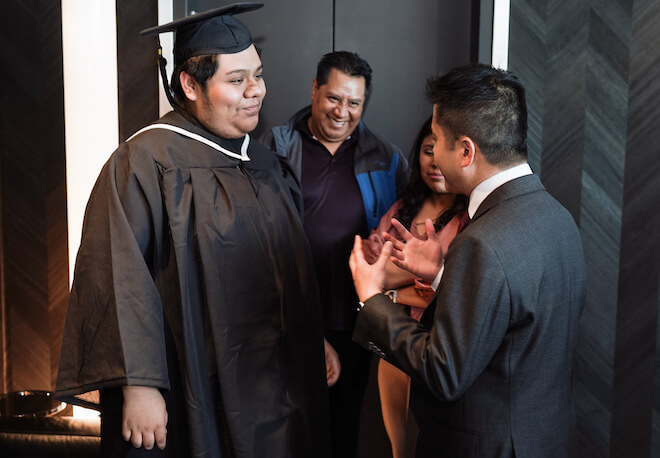
What’s more, the cost to complete an associate’s or bachelor’s degree is the same each year — there’s no readjustment of financial aid or increased tuition, as there often is when a student finishes a community college program and then transfers to another institution to complete a bachelor’s degree. Keeping costs the same from year to year addresses a problem many in higher education consider an even bigger burden than the college debt many college grads incur: the college debt of many people who don’t complete a degree.
“Many people have tried college, have debt, and don’t have a college degree,” Wang says. “And commonly what is preventing them from being able to move forward either financially or with their life in general or to be able to go back to school one day is the fact that they owe money to the government [due to college] grants, or they owe money to the school they briefly attended.” While Wang is grateful that there is now a national conversation around college debt forgiveness, he wants to see this other demographic given just as much support and attention.
Paradigm shift
If your knee-jerk reaction to an online degree is one of skepticism, you’re not alone. Since the founding of Harvard University in 1636, our country has largely held up one model of higher education. And, to be sure, there are for-profit online colleges with predatory marketing and tuition who have previously given online learning a bad name. But the perception of alternative degree programs is changing.
“The stigma has significantly been lifted as we’ve seen major universities across the country, whether it’s Ivy League schools or traditional state universities and private institutions, increasingly embrace the opportunity for a learner to go online or hybrid,” says Brian K. Vas, associate vice president, Partnership Solutions, at SNHU. “I’m not saying that it’s fully gone. But we have certainly seen a lot more embracing of [online degrees].”
College Together co-founder Rodgers says that overcoming skepticism has been a big part of his work. “It’s not just students who are wary — high school counselors and principals and teachers are skeptical, and rightfully so. When you think about education, you want something that has more of a proven aspect. And that’s something that we’re very aware of.”
Rodgers says College Together gets buy-in by being completely transparent: They know they don’t have Division 1 sports, or a bucolic campus, or dorms — and that’s ok. “We’re not trying to pitch something that’s too good to be true,” he says. “It’s just different.” The program also offers an extended orientation trial period; if it turns out that College Together is not the right fit for a student, Rodgers and Wang and their staff are committed to helping a student apply to and attend a college that feels better.
“This program felt like enlightenment — nobody could stop me,” says Charnelle A. Richards.
Laura W. Perna, professor of education and executive director of the Alliance for Higher Education and Democracy (AHEAD) at the University of Pennsylvania, has not studied College Together, in particular, but finds the model compelling for its focus on avoiding debt, and its in-person component. “This kind of model where a student wouldn’t be penalized by having out-of-pocket costs and a loan is very attractive,” Perna says. “And having the requirement for people to come together and meet with advisors and other students recognizes that going to school and completing college courses is hard, and you need support.”
Bright futures
A few weeks ago, College Together held its first graduation ceremony, honoring its first cohort of eight students who’d attained their associate’s degrees. There was Ricky Washington, who completed his degree while simultaneously fulfilling his obligations in the National Guard. He was activated during the George Floyd protests, and College Together staff helped make sure he didn’t fall behind on his work.
There was Cristerfer Aviles, who’d tried community college but never got the one-on-one attention he craved when reading materials became overwhelmingly challenging. “At College Together, there’s always someone there with you, every step of the way,” Aviles says. “It’s not like you’re doing the work alone. I wish I’d known about this sooner, and that more people knew about this opportunity.”
And then there was Charnelle A. Richards (Nelly), who, through tears, acknowledged what meant most to her about the program. “You’re gonna have obstacles and stuff in your way,” Richards says. “But if you got a support system behind you, that’s all you need. This program felt like enlightenment — nobody could stop me.”
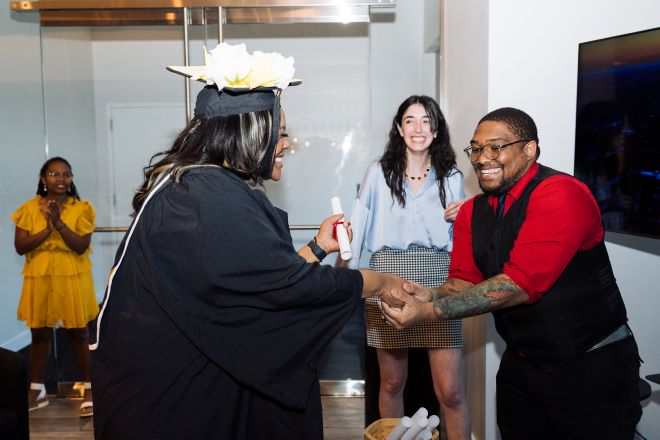
To be sure, what College Together and SNHU are pioneering aligns closely with the zeitgeist. The recognition that getting through college requires as much support as getting to college underlies the work of Gregory Elliott, a professor in the Department of Sociology at Brown University, who created a center for first-generation students. The option to accelerate one’s learning aligns with research by Robert M. Zemsky, a professor at Penn’s Graduate School of Education, about making bachelor’s degree programs three years, instead of four.
With its first graduation having taken place just a few weeks ago, it’s too soon to measure impact and outcomes, but Wang says College Together plans to follow its grads longitudinally. He also finds hope in a 2021 working paper from researchers at none other than Harvard that looked at a similar model, a partnership between SNHU and Boston-based Duet Education.
Studying data from 554 students, researchers found that the program “achieved graduation rates more than twice the Massachusetts state average, cut the cost of college in half, and eliminated race-based college completion disparities.” The paper went on to say that, “While further research is needed, early evidence suggests that this new approach could have significant implications for closing equity gaps in higher education, reducing college debt, and increasing economic mobility.”
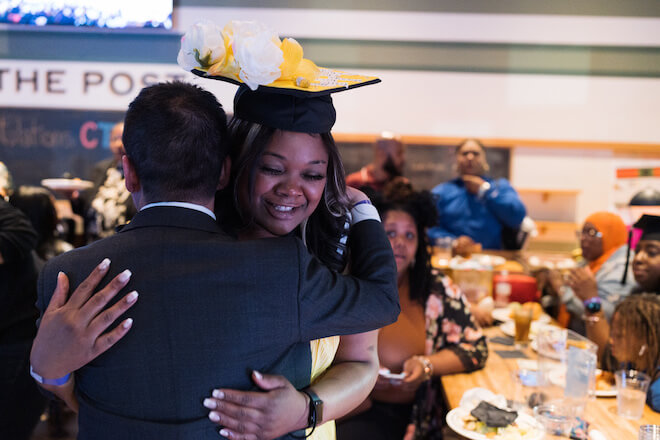
Across the pond, the UK has been pioneering innovative approaches to higher education since at least 1969, with the launch of The Open University (OU). The OU is the largest university in the country, and most of its students complete their coursework independently, off campus — and have been doing so long before distance learning became de rigueur. Educating Rita, the 1985 play by Willy Russell, is centered on a hungry-to-learn protagonist who is determined to turn her life around through higher education at The OU; in one particularly fraught moment, the main character says to her mentor: “He can burn me books an’ me papers but if it’s all in my head then he can’t touch it.”
And along with a degree, that may just be at the heart of what SNHU and College Together are on a path to do: give grads the gifts they have for too long have been told they’re not worthy of attaining – education, power, and opportunity.
![]() RELATED STORIES ON HIGHER EDUCATION
RELATED STORIES ON HIGHER EDUCATION
Courtesy of College Together



